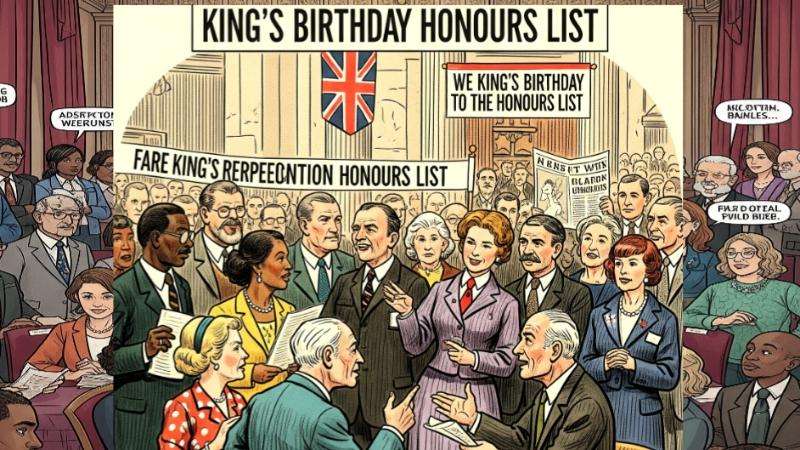Each year, the announcement of the King's Birthday Honours List is met with a mixture of celebration, pride, and often, significant debate. While ostensibly designed to recognise individuals who have made "achievements in public life" and "committed themselves to serving and helping Britain," persistent questions arise regarding the fairness, transparency, and true public resonance of the awards.
Is the system truly recognising the nation's unsung heroes, or is it swayed by influence, celebrity, and even the machinations of PR agencies?
The Promise vs. The Perception: Who Gets an Honour?
The honours system is supposed to be open to everyone, with nominations accepted from any member of the public or an official body. These nominations undergo rigorous "merit," "probity," and "propriety" checks before being considered by a series of independent honours committees, which then pass their recommendations to the Prime Minister and, ultimately, the King for approval. The aim is to acknowledge diverse contributions, from long-term voluntary service and community work to innovation in science, arts, business, and sport.
Indeed, the recent King's Birthday Honours List for 2025 showcases a range of individuals, from prominent figures like Sir David Beckham (knighted for services to sport and charity) and actors Gary Oldman and Roger Daltrey (knighted for services to drama and music respectively), to local community champions. This year's list also included popular TV presenters Tess Daly and Claudia Winkleman (MBEs for services to broadcasting) and even teenage darts sensations Luke Littler and Luke Humphries (MBEs). Such inclusions often spark debate: while their achievements are undeniable in their respective fields, the public often questions if these "celebrity" honours overshadow the recognition of lesser-known, yet equally impactful, individuals.
The PR Agency Promotion: A Systemic Concern?
A growing concern revolves around the alleged involvement of public relations (PR) agencies in securing honours for their clients. While it's not explicitly stated that PR agencies can "guarantee" an honour, their expertise in crafting compelling narratives, identifying key achievements, and navigating the often-complex nomination process can give their clients a significant advantage. These agencies effectively professionalise the nomination process, potentially tilting the playing field away from genuine grassroots nominations.
The issue isn't necessarily that PR agencies are doing anything illegal, but rather that their involvement can create a perception of unfairness. If individuals with the financial means to employ such services are more likely to be recognised, it undermines the principle of meritocracy and the idea that anyone, regardless of their connections or wealth, can be honoured for their contributions. The focus shifts from the inherent value of the service to the quality of the nomination submission, a skill that can be bought.
Examples of Controversial Nominations and Missed Opportunities
Political Appointments: Historically, the honours system has been criticised for appearing to reward political donors or outgoing party loyalists. While this has been a focus of reform, the perception can linger that those with close political ties are sometimes prioritised over broader public contributions.
"Services to Self" vs. "Services to Britain": Occasionally, individuals are honoured for achievements that, while significant in their own careers, do not appear to directly translate to a wider "service to Britain" in the public's eyes. This can lead to cynicism about the criteria applied.
The Unsung Heroes Overlooked: Perhaps the most common criticism is the perceived overlooking of countless dedicated volunteers, community organisers, frontline workers, and innovators whose tireless efforts often go unrecognised. For every celebrity honoured, there are thousands of individuals working quietly to improve their local communities or advance their fields without any expectation of reward. The challenge for the honours system is to genuinely reach these individuals and ensure their nominations are given equal weight and consideration, rather than being drowned out by more prominent or professionally managed submissions.
For instance, while a national sporting hero's knighthood might be widely celebrated, a local charity founder who has dedicated decades to supporting vulnerable people in their community might receive a lesser honour, or none at all, despite arguably having a more direct and profound impact on individual lives.
Analysis: A System in Need of Constant Scrutiny
The King's Birthday Honours list serves an important symbolic function, acknowledging exceptional contributions and inspiring others. However, its effectiveness and public trust are continually challenged by questions of fairness and representation.
The involvement of PR agencies, while not inherently illicit, highlights a systemic vulnerability. It suggests that the system, despite its efforts to be open, might still favour those with the resources to navigate its complexities expertly. To truly be considered "fair," the nomination process needs to be genuinely accessible and equally effective for all, regardless of professional assistance.
Furthermore, the balance between recognising prominent figures and genuinely "real people" – those whose quiet dedication underpins the fabric of society – remains a delicate act. Public perception is key; if the honours list increasingly feels like a roll call of the already famous or well-connected, it risks losing its legitimacy and its ability to inspire genuine civic engagement.
The government's claim that "anyone can nominate someone for an honour" is technically true, but the reality of how those nominations are received, vetted, and ultimately selected needs constant review and transparency. Perhaps a more proactive outreach to community groups, charities, and grassroots organisations could help unearth more of the truly deserving, rather than relying solely on individual nominations or the efforts of paid professionals.
Ultimately, the fairness of the King's Birthday Honours list is not an absolute, but a continuous aspiration. It requires ongoing scrutiny, a commitment to genuine equity, and a willingness to adapt to ensure it truly reflects the diverse and invaluable contributions of all people across the nation.








.svg)
